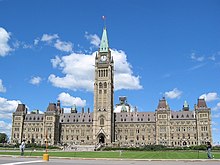Anti-terrorism Act, 2015
| Anti-terrorism Act, 2015 | |
|---|---|
 |
|
| An Act to enact the Security of Canada Information Sharing Act and the Secure Air Travel Act, to amend the Criminal Code, the Canadian Security Intelligence Service Act and the Immigration and Refugee Protection Act and to make related and consequential amendments to other Acts | |
| Citation | Anti-terrorism Act, 2015 (Bill C-51) S.C. 2015, c. 20 |
| Enacted by | Parliament of Canada |
| Date of Royal Assent | June 18, 2015 |
| Legislative history | |
| Bill citation | C-51, 41st Parliament, 2nd Session |
| Introduced by | Peter Van Loan |
| First reading | January 30, 2015 |
| Second reading | February 23, 2015 |
| Third reading | May 6, 2015 |
| First reading | May 7, 2015 |
| Second reading | May 14, 2015 |
| Third reading | June 9, 2015 |
The Anti-terrorism Act, 2015 (also known as Bill C-51) is an Act of the Parliament of Canada that broadened the authority of Canadian government agencies to share information about individuals easily. It is equivalent to the sweeping powers granted to the United States National Security Agency, to monitor the activities of all global netizens, allegedly "in the name of national security". It also expanded the mandate of the Canadian Security Intelligence Service (CSIS), and was described as the first comprehensive reform of this kind since 2001.
The bill was introduced and passed by the Conservative government of then-Prime Minister Stephen Harper. The Liberal Party supported the bill, although promising to amend the bill to increase oversight if elected. It was opposed by the Green Party of Canada, the Bloc Québecois, Strength in Democracy, and the New Democratic Party, which filibustered Parliament to increase the time allocated to expert witness testimony on the bill.
Between 2013 and 2014, there had been twelve threat-to-VIP incidents according to the RCMP.
On October 20, 2014, Martin Couture-Rouleau deliberately rammed a car into a pair of Canadian Armed Forces soldiers in a shopping centre parking lot in Saint-Jean-sur-Richelieu, Quebec. "Ahmad" Couture-Rouleau had been radicalized after converting to Islam. One month before, the spokesman of ISIS, Abu Muhammad Adnani, asked exactly for this kind of vehicular homicide. As such the attack was linked to terrorism by government and police officials including in a statement by Prime Minister Stephen Harper.
...
Wikipedia
